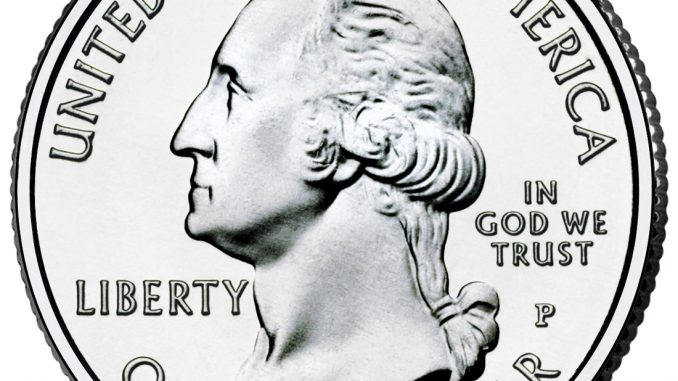
George Washington (1732-1799) was the first President of the United States and is a well known face on American coins. Washington has been on the Quarter (designed by John Flanagan) since 1932. All Americans know his history well, so here is a short bio of this remarkable man for the rest of us.
George Washington – Planter To President
By Alfred Grenfell Fishburne, Jr
In temper and outlook George Washington had little in common with such radicals of the Revolution as Samuel Adams and Thomas Paine. He was a well-to-do planter, who felt the pinch of British imperial control in matters involving his daily activities, such as, restrictive trade laws on the export of tobacco, laws taxing tobacco from one colony to another, levying colonial taxes, and laws prohibiting colonists from taking up western lands to relieve their burdens of debt due to poor crop production.
Young George Washington In The Military
When not yet twenty-one, Washington began his remarkable military career. Shortly after he was appointed major in the Virginia militia, he was delegated by Governor Dinwiddie of Virginia to carry to the commander of the French forces on the Ohio River the momentous message which precipitated the French and Indian War by demanding, in the name of King George II, that the French withdraw from the Ohio Valley.
Young Washington’s heroic efforts in defending Fort Necessity, his heroism in the attack of General Braddock’s army on the Monongahela, and his participation as colonel of a Virginia regiment in the taking of Fort Duquesne were the start of his brilliant military career.
Washington Returns Home
After the British defeated the French at Fort Duquesne, George Washington resigned his military command, married, settled at Mount Vernon, and continued his life as a planter. He took a relatively unimportant part in the agitation against British measures adversely affecting the colonies from 1759 to 1774.
However, when the British “Intolerable” Acts of 1774, directed chiefly against Boston and Massachusetts, but threatening the freedom of all the colonies, led to the assembling of the Continental Congress at Philadelphia, George Washington was one of the Virginia delegates.
Commander-In-Chief
When war broke out, a commander-in-chief of the united colonial forces was required. Washington was the logical choice because of previous military service. As commander-in-chief, Washington’s greatest feat probably was keeping his men together after the dis-heartening defeat at Fort Washington on Upper Manhattan Island. He gathered the remnants of his army together and defeated the British at Trenton and Princeton.
Character Of A Hero
At war’s end in 1782, George Washington faced perhaps the biggest crisis of his career, one that would define his character as a great American hero. His men had forgone pay for as much as six years during the war, with a nearly bankrupt Congress, considering a permanent non-payment of the troops.
Washington himself was approached to lead an armed rebellion against Congress to allow him to be set up as king, but these men did not understand his character. He responded with these words, “You could not have found a person to whom your schemes are more disagreeable”, “Banish these thoughts from your minds.”
On March 15, 1783, Washington met with the men in Newburgh, New York. “Gentlemen”, he spoke, addressing a crowded room, “As I was among the first who embarked in the cause of our common Country; as I never left your side one moment, but when called from you on public duty; as I have been the constant companion and witness of your Distresses… it can be scarcely be supposed… that I am indifferent to your interests. But… this dreadful alternative, of either deserting our Country in the extremist hour of her distress, or turning our Arms against it,… has something so shocking in it that humanity revolts from the idea… I spun it, as every man who regards liberty… undoubtedly must.” Washington, by his selfless example, had shamed the conspirators out of their plot.
President George Washington
When the war ended in 1783, Washington resumed his life as planter and land promoter at Mount Vernon. In less than four years he was called from his comfortable life as private citizen and asked to lead the Virginia delegation to the Convention at Philadelphia, called to strengthen the Articles of Confederation.
He was elected President of the government established under the Constitution framed at the Convention. For the next eight years, as President, his integrity made it possible for him to command general respect; and as a Federalist, a believer in strong central government, and a conservative in matters of credit and finance, he helped to establish the young republic firmly in the eyes of its own citizens, as well as of Europe. In 1797, George Washington returned to Mount Vernon where he died two years later in December 1799 a great American hero.
Visit The Story of America, where the American story is shared from its beginnings in concise segments at: thestoryofamerica.org.
Article Source: George Washington – Planter To President








